‘Yes, you are right. With my dark face and monkish past, I am best to keep quiet and stay indoors when I can. And not talk too widely about the discoveries of Vesalius, still less this Polish scholar who says the earth goes round the sun. But what peace of mind is there even at home?’ he added, so quietly I barely heard him. His face was suddenly full of pain and sadness.
‘Are you all right, Guy?’ I asked quietly. ‘Have you some trouble of your own?’
‘No.’ He smiled. ‘Only the aches and pains of old age. And I have had enough of wine and should go to bed.’ He rose. ‘Good-night.’
‘I shall tell Adam Kite’s parents you will see them. They will be relieved.’
We shook hands and I left. I was glad we had parted on good terms after all. But I did not believe him when he said nothing was wrong.
NEXT MORNING I went to fetch Dorothy to accompany her to the inquest. She had not been out of doors since Roger’s death, and I was worried about how she would cope. Crossing Gatehouse Court I saw that as at Westminster the fountain’s underground valve had been turned and the water had come on; it splashed merrily into the huge bowl. The weather was still mild, the birds chirking in the trees. The world of nature was being reborn, though I could take no pleasure in it.
Dorothy sat in her chair by the fire, the faithful Margaret beside her. Both were dressed in deepest black and wore coifs with long black wings behind, the pale oval of Dorothy’s face staring out starkly. I was reminded of that other mourner I had recently seen, Catherine Parr. Dorothy gave me a brave smile.
‘Is it time? Yes. I see from your expression that it is.’ She sighed, looking at the frieze above the fireplace. I followed her gaze. A weasel looked out at me from between thick wooden vines. ‘How lifelike that is,’ I said.
‘Ay, Roger was so fond of it. He was displeased with the repair of that corner after it was damaged.’
‘Are you sure you can bear this?’ I asked, looking at her white face and sunken cheeks.
‘Yes,’ she said with a touch of her old firmness. ‘I must see Roger’s killer caught.’
‘I will do the identification of the body, if you wish.’
‘Thank you. That – that might be too much.’
‘We shall take the boat to the Guildhall.’
‘Good.’ She hesitated, then asked suddenly, ‘What are they saying, in the streets?’
‘Just that there was a nasty murder here.’
‘If I hear anyone speak badly of Roger I shall fly at them.’
‘That’s the way, mistress,’ Margaret said approvingly. She helped Dorothy rise to her feet.
THE GREAT PILLARED vestibule of the London Guildhall was as busy as usual. Unusually, a pair of constables in city livery were posted by the door. Within, council and guild officials scuttled to and fro. Some glanced curiously at a large group of black-robed lawyers gathered in a corner. I recognized the stern face of Treasurer Rowland; the others were all Lincoln’s Inn barristers – the jury. I was surprised that apart from Treasurer Rowland they were all very young; there was no one else there of any seniority. Some looked distinctly uneasy, as did the two students who had found the body and who stood on the fringe of the group. Guy stood a little apart, talking to Barak.
Dorothy looked at the crowd, hesitated, then moved to a bench by the wall. She sat, signalling Margaret to join her. ‘We will wait here until the court opens,’ she told me. ‘I cannot face talking to anyone.’
‘Very well.’
I crossed to Barak and Guy. ‘Good day, Matthew,’ Guy said. He looked across at Dorothy. ‘Is that the poor widow? She is very pale.’
‘It has cost her much to come today. But she is brave.’
‘Yes, one senses strength beneath her suffering.’ He nodded at Barak. ‘Jack here has noticed something strange.’
‘What?’
Barak looked red-eyed, a little bilious. Had he had yet another night in the taverns? He leaned close; his breath was sour.
‘A spectacular death like this,’ he said, ‘you’d think there’d be a crowd here to fill the public gallery. But those constables are turning folk away.’
‘Really?’ That would be good for Dorothy, but it was unheard of; the coroner’s court, like all jury courts, was supposed to be public.
‘Brother Shardlake, a word.’ Treasurer Rowland appeared at my elbow. I followed him away from the group.
‘My clerk tells me no spectators have been allowed in,’ I said.
‘The usher says the coroners have decided the hearing is to be private, to prevent idle babble. I have never heard of such a thing.’
We were interrupted by a black-robed usher calling from a doorway. I went back to Dorothy. She rose to her feet; lips set, a spot of red in each cheek. ‘Take my hand, Margaret,’ she said quietly. The jurors parted to let her enter the courtroom.
WE HAD BEEN GIVEN one of the meeting rooms. Rows of benches faced the table where the two coroners already sat. The usher guided me, along with the other witnesses, to the front row and the jurors took the two rows behind. The rows where the public would have sat were empty. I studied the two coroners sitting at the table facing us. Browne slouched with his plump hands folded across his ample stomach. Next to him sat a very different man: in his early forties, short but strongly made, with a square face. Thick brown hair curled beneath his black cap and he had a short, neat beard just starting to go grey. He met my look; the gaze from his bright blue eyes was sharp, appraising.
‘That’s Sir Gregory Harsnet,’ Barak whispered. ‘The King’s assistant coroner. He used to be in Lord Cromwell’s camp, he’s one of the few reformers who’s kept his place.’
Browne let out a little belch; Harsnet frowned at him and he turned another belch into a cough and sat up straight. No doubt who was master here. The doors were closed.
‘We will come to order, please.’ Harsnet spoke in a clear, quiet voice with a west country accent, his eyes roving round the room. ‘We are here today to adjudicate on the sudden and dreadful death of Roger Elliard, barrister of Lincoln’s Inn. As the jurors are all lawyers I do not need to tell you that today we shall view the body, hear the evidence and decide whether we can come to a verdict.’
The jury was sworn in, the young barristers stepping up to take the Testament from the usher. Then Harsnet addressed us again.
‘Before we view the body I would call Dr Guy Malton, who has been charged with examining it, to tell us what he found.’
Guy stood and recited his impressive medical qualifications, the jurors staring curiously at his brown skin. He spoke of how he believed Roger had been rendered unconscious using the drug called dwale, then carried to the fountain where his throat had been cut.
‘He was alive when he went in,’ he said. ‘He died from a massive loss of blood, not drowning. That means’ – he hesitated – ‘that means his throat was cut, then he was held over the fountain until he died, and then was thrown in.’
There was silence in the courtroom for a moment, as the full horror of the scene Guy described sank in. Then Harsnet asked, ‘How long was he dead before he was found?’
‘Some hours. Rigor mortis would be delayed by the cold.’ He looked at me. ‘And I believe a skin of ice had had time to reform on the fountain.’
‘It had,’ I said.
I glanced across Barak to Dorothy, who sat with Margaret on Guy’s other side. She was quite still, her face expressionless. She seemed smaller somehow, as though shrinking into those heavy black clothes.
Harsnet frowned at Guy. ‘What object could anyone have in creating such a terrible spectacle? A man dead in a fountain of blood.’
Читать дальше
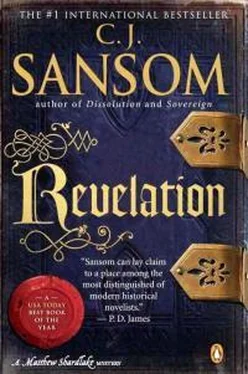
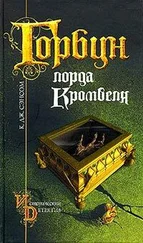
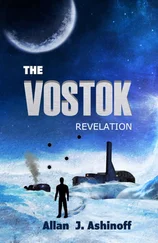
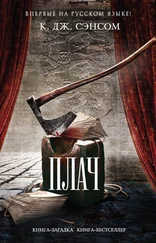

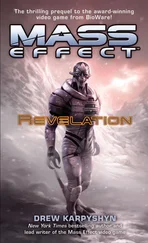
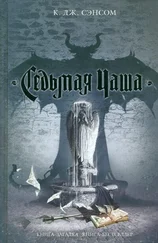
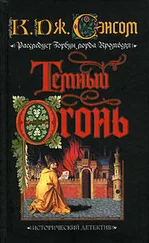
![К Сэнсом - Стенание [другой перевод]](/books/432043/k-sensom-stenanie-drugoj-perevod-thumb.webp)

